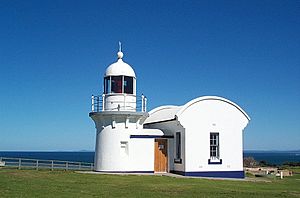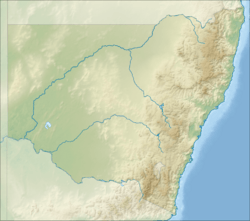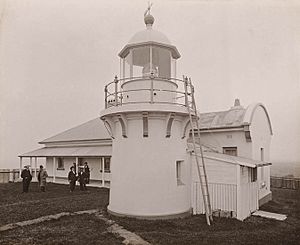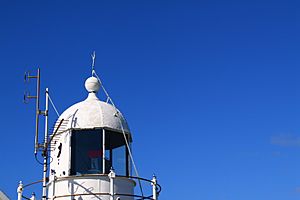Crowdy Head Light facts for kids
 |
|
| Crowdy Head Light, 2008 | |
|
|
|
| Location | Crowdy Head New South Wales Australia |
|---|---|
| Coordinates | 31°50′36.32″S 152°45′12.79″E / 31.8434222°S 152.7535528°E |
| Year first constructed | 1878 |
| Automated | 1928 |
| Foundation | concrete slab |
| Construction | limestone |
| Tower shape | cylindrical tower with balcony and lantern attached to one-story service builtding |
| Markings / pattern | white tower and lantern |
| Height | 24 feet (7.3 m) |
| Focal height | 201 feet (61 m) |
| Original lens | 4th order fixed catadioptric |
| Intensity | 28,000 cd |
| Range | white: 16 nautical miles (30 km) red: 13 nautical miles (24 km) |
| Characteristic | Fl (2) W 10s. Fl R (to northeast.) |
| Admiralty number | K2784 |
| NGA number | 111-6028 |
| ARLHS number | AUS-062 |
Crowdy Head Light is a working lighthouse found at Crowdy Head. This is a piece of land sticking out into the sea, located between the towns of Forster and Port Macquarie in New South Wales, Australia. It is listed on the Register of the National Estate, which means it's an important historical place.
Contents
What is the History of Crowdy Head Light?
The first station in this area was a pilot station set up in 1860. It was located nearby in Harrington. A pilot station helped guide ships safely into the Manning River.
The lighthouse you see today is one of five similar lighthouses. They were all designed and built by James Barnet between 1878 and 1880. The other lighthouses like it are Fingal Head Light, Clarence River Light (which is now gone), Tacking Point Lighthouse, and Richmond River Light.
When it first started, the Crowdy Head Light used a special lens called a 4th order catadioptric apparatus. This lens made a steady white light. It wasn't very bright, less than 1,000 cd. Only one keeper was needed to look after it.
How the Lighthouse Changed Over Time
In 1928, the light system was updated. It was changed to a carbide lamp, which used acetylene gas. This made the light much brighter, about 1,500 cd. At the same time, the lighthouse became automated. This meant it could run on its own without a keeper.
The pilot station that helped ships was closed in the 1960s. Then, in 1972, the lighthouse was changed again. It started using mains electricity for its power.
In 2002, something interesting happened. The original 4th order Fresnel lens from the lighthouse was sold online. It was bought on eBay for $20,000! You can now see this old lens on display at Sea Girt Light in New Jersey, USA.
What Does the Crowdy Head Light Look Like?
The lighthouse has a round tower. On top of the tower is a platform made of a dark blue stone called bluestone. This platform is held up by special stone supports called corbels. You can reach the platform by a metal staircase. This staircase starts from the concrete floor that also forms the base of the buildings.
The walls of the tower are made of stone bricks. They get thinner as they go up. At the bottom, the walls are about 19 inches (480 mm) thick. At the top, they are about 14 inches (360 mm) thick.
A small covered entrance, called a porch, connects the tower to a rectangular building next to it. This building, or annexe, used to be where the keeper worked and where fuel was stored.
All the outside walls of the lighthouse are covered in cement and painted white. The platform on top has a simple metal dome that covers the light. A white metal handrail goes around the edge of the platform.
Who Manages the Crowdy Head Light?
The light itself is managed by Roads and Maritime Services. This group used to be called NSW Maritime. The land and buildings around the lighthouse are managed by the New South Wales Department of Lands.
Can You Visit Crowdy Head Light?
Yes, you can visit the area around the lighthouse. The grounds are open to the public. However, the lighthouse tower itself is usually closed.
See also
 In Spanish: Faro de Cabo Crowdy para niños
In Spanish: Faro de Cabo Crowdy para niños
 | Tommie Smith |
 | Simone Manuel |
 | Shani Davis |
 | Simone Biles |
 | Alice Coachman |




